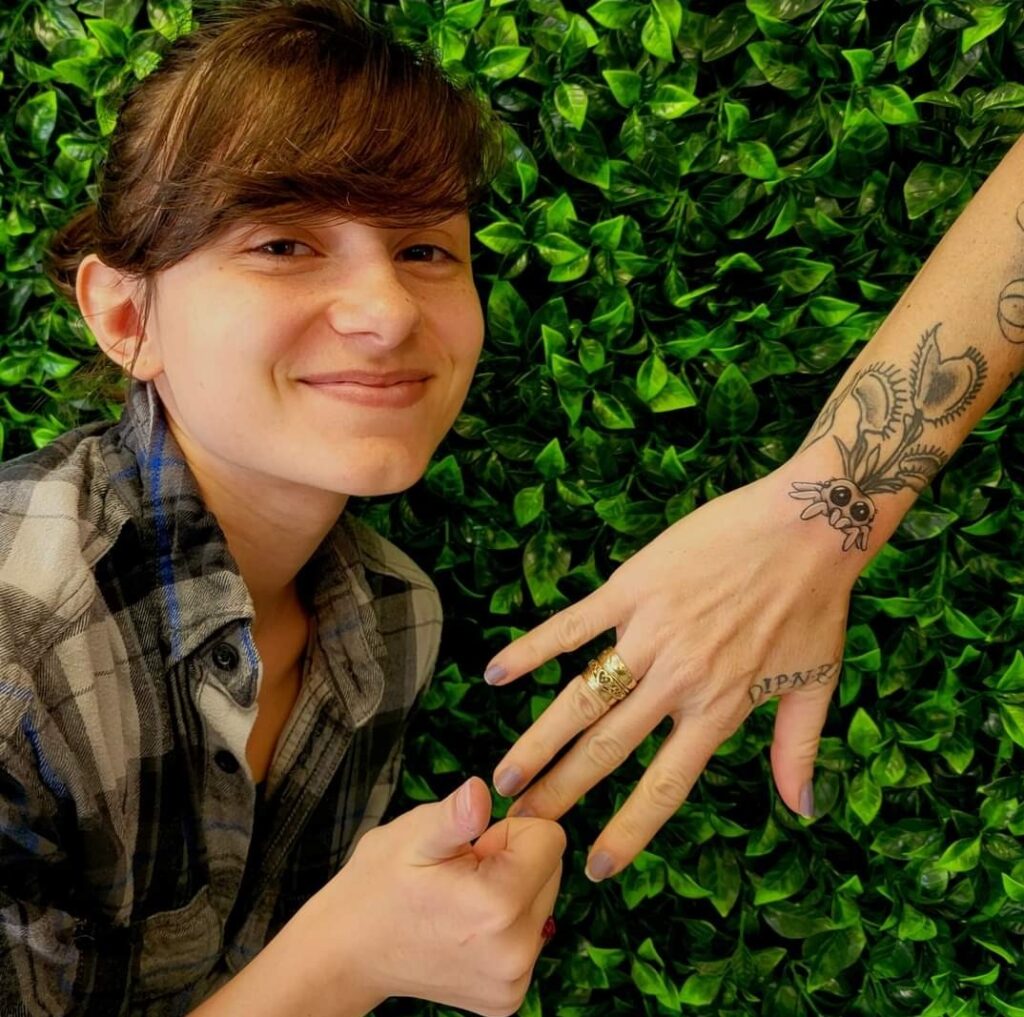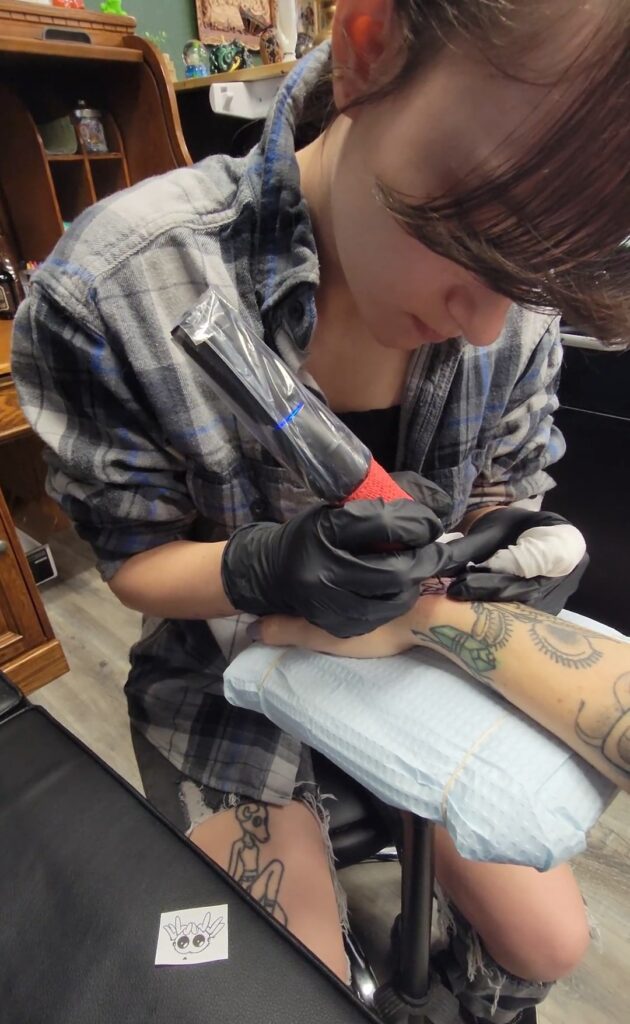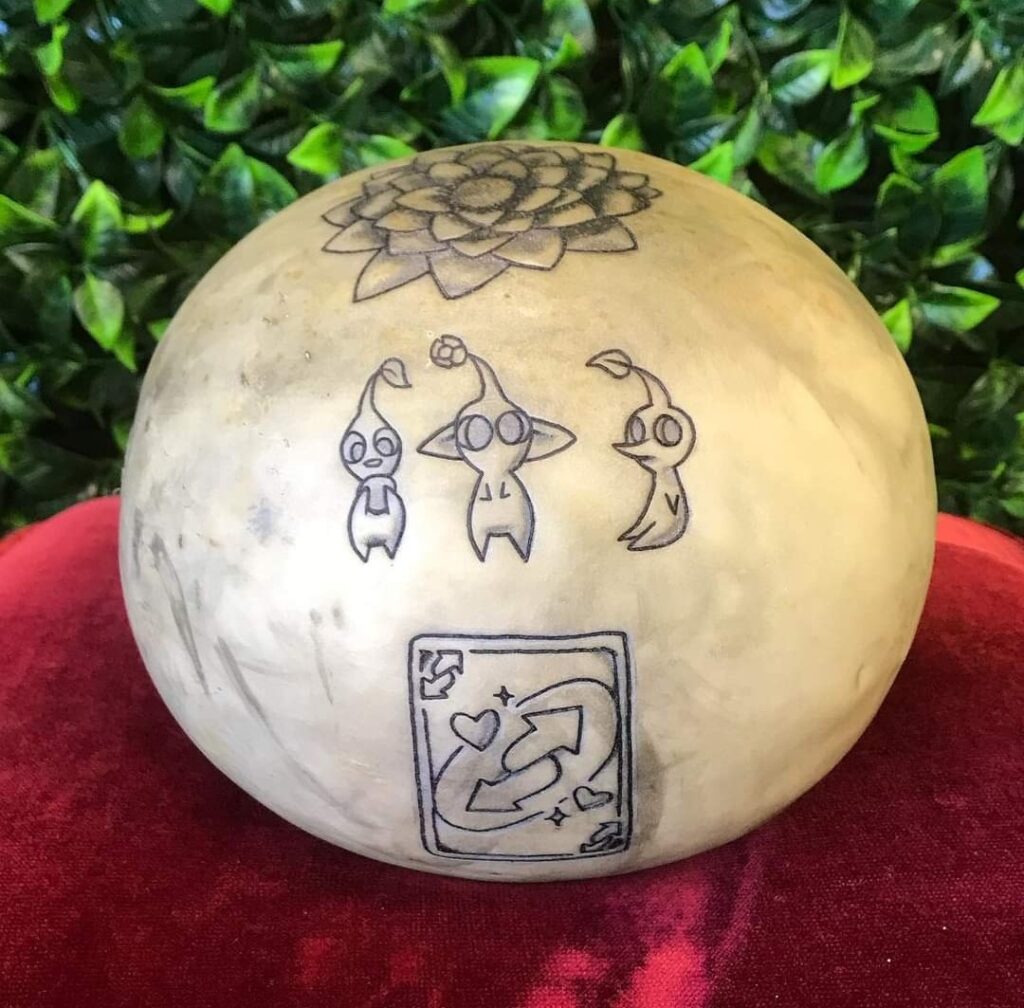Aleaha Waldroup, a fine arts major, is trading her paint and brushes for ink, needles and human canvases as an apprentice at a tattoo shop in Hayesville, North Carolina.
Waldroup enrolled at WCU in 2018 hoping to get a Bachelor of Arts with a concentration in painting. Instead of finishing her last six credits she needs to graduate, Waldroup is taking a gap year. In the meantime, she is an apprentice at The Upper Room Tat2 Parlor in hopes to become a tattoo artist.
Waldroup has always been interested in art since she was a child, sketching on her homework or having classmates ask if she can draw them.
“I was one of those kids who got the giant, terrible art kits for Christmas,” said Waldroup.

Waldroup became passionate about art when she took the chance as an art major and realized that art has the potential to be a career.
Waldroup became more serious about art during her first year at WCU because, “I wanted to show I was worthy of being here,” said Waldroup.
WCU Arts sculpture professor J. Morgan Kennedy helped her not be too serious about art and make work she is happy with. This was Waldroup’s biggest breakthrough as an artist and she started developing her own style.
One of Waldroup’s pieces that she is the proudest of is, “Comfort Words.” The piece was a chain of 80 small pillows she made and embroidered with curse words she heard throughout the day.
“Comfort Words” was displayed at the 52nd annual juried undergraduate exhibition from Feb. 18 to March 20, 2020 and won an award for materials used.
“It represents how comfortable people have gotten using these words and casually speaking them. The piece was soft and even nice to cuddle with,” said Waldroup.
Making art is therapeutic to Waldroup and viewing other people’s work challenges her to understand how others feel.
Waldroup is an introvert and has trouble connecting with people through conversations. Art is a comfortable way of showing her thoughts and feelings.

“I’ve always been a shy person and still am. Art only helps in a way that people can glimpse into what I am, but I can still control what I’m displaying,” said Waldroup.
Waldroup believes that self-expression is an important aspect of art in any medium. She carries this belief into tattooing.
Waldroup gained interest in tattoos at the end of high school, when her ex-boyfriend got an unprofessional, or “scratcher” tattoo.
“Tattoos are important for self-expression and I am one of those people that firmly believes that tattoos don’t need to mean anything wonderful. A tattoo can just be silly fun and that’s enough meaning for me,” said Waldroup.
Waldroup acquired her apprenticeship when one of her professor’s called the shop and recommended her. Waldroup did not ask the professor to do this and advised that it is usually the student who should find these opportunities on their own.
“I’ve always wanted to explore every medium that I think looks fun and this one seems very exciting, and I really like the idea of how permanent it is,” said Waldroup.
The Tattoo process
View the video below to learn the tattoo process
The tattoo process starts with a sketch and Waldroup does hers on an iPad. The design can be something she draws in her free time or designs are created in collaboration with a client.
The next step is to run the design through the stencil machine. The stencil is then put on the person’s skin.
The tattoo is made by using ink and a needle to do the outline, color in the design, and ending with highlights.
Role as an Apprentice
Waldroup’s mentor is Ryshell Lynch, the owner of The Upper Room Tat2 Parlor and the parlor’s second location in Florida. Lynch has 13 years of tattooing experience.

Waldroup’s roles as an apprentice is to clean the tattooing stations, make appointments, sweep. She also practices tattooing on herself, on Lynch, fake skin, and various fruits and vegetables.
As an apprentice, Waldroup is not allowed to tattoo clients or tattoo outside of the shop.
Waldroup has been an apprentice at The Upper Room Tat2 Parlor for 11 months. The completion of her apprenticeship depends on her progress. According to Lynch, an apprentice is deemed accomplished when they have the adequate skills to tattoo unsupervised and Lynch can vouch for the quality.
According to Lynch, Waldroup is a great apprentice because she absorbs information well, she listens, she does what Lynch asks, she’s helpful, and not argumentative.
“She cares a lot which is sometimes her own demise, but I think that if she can get past her own inner dialogue of being scared about how much she cares, then she’s going to be really great at this… and really the most important thing is her caring, so it’s a double-edged sword,” said Lynch.
Waldroup said that she still needs to work on the emotional side of the job, the stresses and communicating with clients. Her technique also needs more work.
Tattoo artists face many stresses and Waldroup has experienced these through her apprenticeship. Waldroup explained that she is always thinking about designs and drawing outside of the shop. She also helps with clients who call in past shop hours. She also stresses about the process of tattooing and is afraid of messing up because it’s something that is going on someone’s body forever.
Waldroup’s style is cartoonish and features anime, and most clients don’t ask for this, so a lot of the time she draws things she doesn’t enjoy. Lynch also relates with having to tattoo the same things a lot, so she faces burnout sometimes.
Lynch feels like tattoo artists can’t discuss stresses of the job because they are faced with stigma from people telling tattoo artists to “stop complaining” and “do your job.”
Even with the challenges, being a tattoo artist is rewarding according to Lynch.
“The best part is when you’re done, and they stand up. It’s literally like watching a kid open a Christmas present, they’re super excited,” said Lynch.
Waldroup’s career goal is to be a tattoo artist and right now she is dedicated to practicing and working hard to make that possible.


